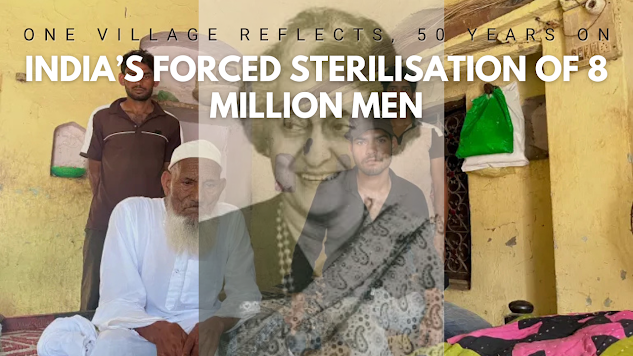🇮🇳 50 Years After India's Emergency: A Village That Still Remembers the Night of Forced Sterilisation
Uttawar, nestled in Haryana’s Mewat region, was surrounded by police as part of India's mass forced sterilisation campaign during the 21-month national Emergency declared by Prime Minister Indira Gandhi on June 25, 1975. 🛑 Civil liberties were suspended, the press was censored, political opponents jailed — and millions of men were coerced into sterilisation surgeries.
Over 8 million vasectomies were performed, with nearly 2,000 deaths reported due to botched procedures.
The Night of Fear⚔️
Deenu, then a young man, along with 14 others, was rounded up and taken to a sterilisation camp. “We were given away to protect the village,” he said, reflecting on what he calls a "sacrifice" for future generations. Today, Deenu is the last living member among those 15 men, and he lives with the memory of that fateful night — a time that left deep emotional and social scars on the village.
Thirteen-year-old Mohammad Noor remembers policemen breaking doors and destroying property as families scattered in panic. Even food was sabotaged, with sand mixed into flour. Noor was taken to the police station but spared sterilisation due to his age.
The village head, Abdul Rehman, stood firm, refusing to “hand over even a dog” to the authorities. But despite his resistance, the raid happened, and silence descended on Uttawar — described by locals as a “graveyard” in the aftermath.
A Legacy That Haunts💔
India began its family planning efforts as early as 1952, but the Emergency unleashed a brutal phase of enforcement. Quotas were imposed, water supplies were cut off to uncooperative villages, and foreign aid — including $66 million from the World Bank — supported the program.
Communities like Uttawar, with high Muslim populations and birth rates, were disproportionately targeted.
Today, India's fertility rate is around two children per woman, and coercive sterilisation is no longer government policy. But experts believe the Emergency's authoritarian legacy still casts a shadow. 🕯️
Social scientist Shiv Visvanathan remarked that the Emergency era laid the foundation for an authoritarian style masked as democracy. “From Indira to Modi, each one added to the erosion of democratic institutions,” he said.
Free speech advocate Geeta Seshu added that while civil liberties were explicitly suspended during the Emergency, today's restrictions come through fear, self-censorship, and weaponised laws.
We Saved This Village🌱
When Deenu was taken in 1976, his wife Saleema was pregnant. A month after his vasectomy, she gave birth to their only son. In 2024, Saleema passed away, but Deenu now sees his grandsons and great-grandchildren growing up.
“Seven generations I’ve seen with these eyes,” he says proudly, sipping a cold drink from a plastic cup. 🧃 “How many people can say that?”
Despite the trauma, he remains proud of his role in protecting Uttawar. “We are the ones who saved this village,” he says. “Otherwise, Indira would have set this village on fire.” 🔥

Comments
Post a Comment